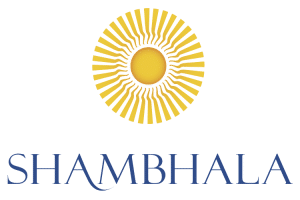The Process Team (PT) has focused during the month of June on “landing” the work we have been doing since we took our seats just over four months ago (on Shambhala Day). As part of this effort, we have chosen an awareness-based change methodology called Theory U to assist PT members – and eventually other interested sangha members – in guiding difficult conversations throughout the community.
Some of you may have heard of Theory U and the work of Otto Scharmer and the Presencing Institute, which have a close relationship with Shambhala and have collaborated directly with Acharyas Arawana Hayashi and Susan Skjei, among others.
The idea behind Theory U is that to facilitate responsive and positive change in the world around us, individual and collective capacities that incorporate the inner world of humans are crucial. Three capacities, in particular, are emphasized:
1) Open mind (inquiry, curiosity)
2) Open heart (empathy and compassion)
3) Open will (courage; letting go and letting come)
As Shambhalians, you will recognize these capacities as part of the path of the Dharma. What is unique about Theory U, and why we are engaging its methodology at this particular time in our history, is that it is designed to facilitate engagement with systemic disruption and social chaos like that we are experiencing in our community, and to give birth to co-created alternatives.
There is much more to be said about Theory U, and you may read about some of the methods it employs on the PT website, and at the links above. For now, we wanted to give you a preview. We will be training ourselves over the next few months, as well as continuing to make resources available for the decentralized conversations and efforts already underway throughout the community. It should become clearer, as we proceed, how these tools might be of use in your local situations, where many of you are already engaging with an emerging future.
In other PT news, you will have heard by now from the Interim Board (IB) about the survey they and the PT Survey Working Group (SWG) released. If you missed their recent message, you may find more information here (you must log in to Shambhala.org to view). You can expect a second survey from the IB and the SWG on the topic of Care and Conduct in July. You may want to add [email protected] to your contacts so that it is not inadvertently delivered to your junk mail folder.
You can read our new PT Mission and Vision Statements developed by the Charter Working Group on our website. As always, full PT Working Group updates can also be found there.
Please note that our next update will be at the end of August to allow the communications team to work in earnest between now and then on the PT implementation plan. Meanwhile, if you wish to contact us, please email us at [email protected] or send a note through the PT website; simply replying to this message will route your message elsewhere, thus delaying our receiving it.
As a final note, we would like to respond to pointed questions we have received regarding contact between the PT and the Sakyong. A few of you have asked directly whether we have contacted him, either to implore us to request that he return to teaching or to insist that we demand he step down permanently. We hear the pain in these different views – in fact, they are reflected in the PT itself. We also are part of the sangha, and are equally affected by these contradictory positions.
The answer is that we have not contacted the Sakyong except to express our condolences at the passing of his mother, Lady Könchok. We also have neither the authority nor the desire to choose the path that the community will follow (though individual PT members have made their preferences known). We do, however, see it as our role to help restore the community to wholeness. Thus, in addition to the work discussed above, we are exploring the appropriateness for our situation of restorative justice processes.
We continue to read your feedback with interest. Thank you for the many supportive messages, as well as notes of concern about our work, the slow pace of change, and the uncertainty of our future. We share these concerns, and we are working as hard as we can to help bring about meaningful and positive transformation as quickly as possible in our community.
With love and appreciation,
The Shambhala Process Team

